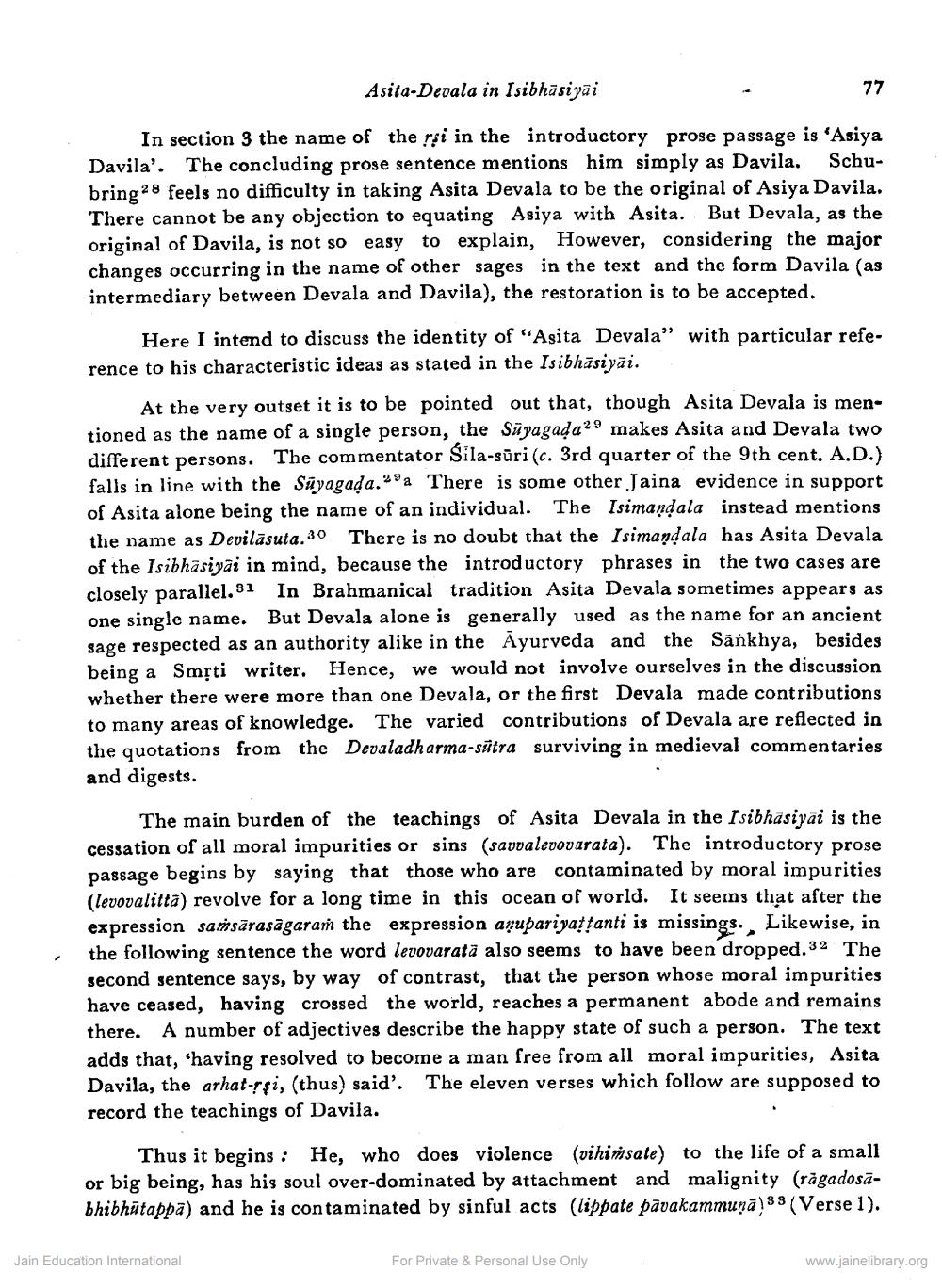Book Title: Asita Deval in Isibhasiyai Author(s): Lallan Gopal Publisher: Z_Aspect_of_Jainology_Part_3_Pundit_Dalsukh_Malvaniya_012017.pdf View full book textPage 4
________________ Asita-Devala in Isibhāsiyāi 77 In section 3 the name of the rsi in the introductory prose passage is 'Asiya Davila'. The concluding prose sentence mentions him simply as Davila. Schubring28 feels no difficulty in taking Asita Devala to be the original of Asiya Davila. There cannot be any objection to equating Asiya with Asita. But Devala, as the original of Davila, is not so easy to explain, However, considering the major changes occurring in the name of other sages in the text and the form Davila (as intermediary between Devala and Davila), the restoration is to be accepted. Here I intend to discuss the identity of "Asita Devala" with particular reference to his characteristic ideas as stated in the Isibhāsiyāi. At the very outset it is to be pointed out that, though Asita Devala is mentioned as the name of a single person, the Süyagada29 makes Asita and Devala two different persons. The commentator Sila-sūri(c. 3rd quarter of the 9th cent. A.D.) falls in line with the Süyagada." Pa There is some other Jaina evidence in support of Asita alone being the name of an individual. The Isimandala instead mentions the name as Devilāsuta.30 There is no doubt that the Isimandala has Asita Devala of the Isibhasiyāi in mind, because the introductory phrases in the two cases are closely parallel. 81 In Brahmanical tradition Asita Devala sometimes appears as one single name. But Devala alone is generally used as the name for an ancient sage respected as an authority alike in the Ayurveda and the Sankhya, besides being a Smộti writer. Hence, we would not involve ourselves in the discussion whether there were more than one Devala, or the first Devala made contributions to many areas of knowledge. The varied contributions of Devala are reflected in the quotations from the Devaladharma-sútra surviving in medieval commentaries and digests. The main burden of the teachings of Asita Devala in the Isibhāsiyāi is the cessation of all moral impurities or sins (savvalevovarata). The introductory prose passage begins by saying that those who are contaminated by moral impurities (levovalitta) revolve for a long time in this ocean of world. It seems that after the expression samsārasāgaram the expression anupariyattanti is missings. Likewise, in the following sentence the word levovarată also seems to have been dropped.32 The second sentence says, by way of contrast, that the person whose moral impurities have ceased, having crossed the world, reaches a permanent abode and remains there. A number of adjectives describe the happy state of such a person. The text adds that, 'having resolved to become a man free from all moral impurities, Asita Davila, the arhat-rși, (thus) said'. The eleven verses which follow are supposed to record the teachings of Davila. Thus it begins : He, who does violence (vihimsate) to the life of a small or big being, has his soul over-dominated by attachment and malignity (rāgadosabhibhūtappa) and he is contaminated by sinful acts (lippate pavakammunā)(Verse 1). Jain Education International For Private & Personal Use Only www.jainelibrary.orgPage Navigation
1 2 3 4 5 6 7 8 9 10 11 12 13 14
